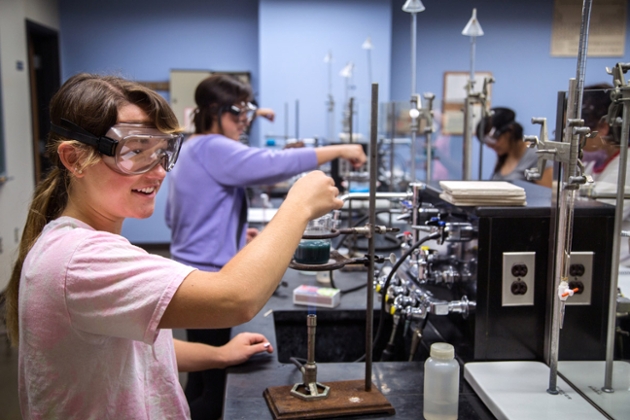Undergraduate Programs in Chemistry
Chemistry sometimes is called the "central science" because it connects other sciences to each other, such as biology, physics, geology and environmental science.

Why study Chemistry?
Chemistry is the central science and an important component of a liberal arts education. Our program emphasizes a molecular view of matter and reactions, a view that combines the intrigue of theories and the power of practical applications.
Our own bodies, the clothes we wear, the medicines we take, the food we eat, and the fuel we pump into our vehicles are all various combinations of incredibly tiny particles called molecules, which are themselves composed of atoms. The knowledge of substances and chemical reactions is essential to the practice of the other physical and health sciences.
What can I do with my Chemistry degree?
Studying chemistry puts you in an excellent position to choose from a wide variety of useful, interesting and rewarding careers. A person with a bachelor's level education in chemistry is well prepared to assume professional positions in industry, education, or public service.
A chemistry degree also serves as an excellent foundation for advanced study in a number of related areas. The list of career possibilities for people with training in chemistry is long and varied. Even in times when unemployment rates are high, the chemist remains one of the most highly sought after and employed scientists.
Bachelor of Science in Chemistry
The BS in Chemistry requires the core and cognates, plus nine hours of advanced work in chemistry, during which one can concentrate on a particular area. This program is recommended for those interested in graduate study or employment as a chemist.
Questions: Dr. Haizhen (Andy) Zhong | Coursework
Bachelor of Science in Chemistry - Medicinal Chemistry Option
The BS in Chemistry with a Medicinal Chemistry Option is designed for students interested in applying their chemistry knowledge in the area of medicine. It is especially valuable for those students planning to enter professional school for pharmacy or medicine or graduate school in medicinal chemistry or the biomedical sciences.
Questions: Dr. Douglas Stack | Coursework
Bachelor of Science in Chemistry - Education Option
The B.S. with a Concentration in Education is designed for those students interested in teaching high school chemistry. It could also be appropriate for those planning to teach at higher levels of education and wish to learn educational techniques. The concentration in education requires a minimum of 39 credit hours of course work in chemistry and a minimum of 36 credit hours in the College of Education, Health, and Human Sciences.
Questions: Dr. Haizhen (Andy) Zhong | Coursework | College of Education, Health, and Human Sciences
Bachelor of Arts in Chemistry
The Bachelor of Arts in Chemistry requires a core of 33 credit hours of chemistry courses, calculus and physics cognates, foreign language competency, and at least three additional hours of chemistry work. It is used by those interested in careers such as education, forensic science, law, marketing, and science writing.
Questions: Dr. Haizhen (Andy) Zhong | Coursework
Bachelor of Science in Environmental Studies - Analytical Sciences
The Analytical Sciences Option is designed to produce chemists who are particularly interested in the chemical pollutants that are being released into the air, earth, and water environments of our planet. They may find jobs with local and state health departments, state and national environmental protection agencies, local testing laboratories, as well as in the private chemical-producing industries. Typically graduates work as laboratory and field technicians who sample and analyze chemical pollutants.
Questions: Dr. Andrew Miller | Coursework | Environmental Studies
Chemistry Minor
A minor in chemistry requires a minimum of 20 credit hours of approved chemistry courses.
All courses counted toward a minor must be taken from classes approved for chemistry majors, and must include courses from at least two different areas of chemistry. Transfer students seeking a minor must take courses within the UNO Department of Chemistry above the 1000-level in at least two areas.
Questions: Dr. Haizhen (Andy) Zhong | Catalog Information